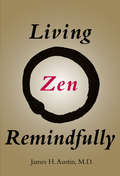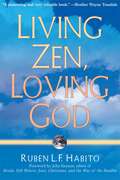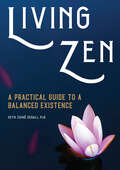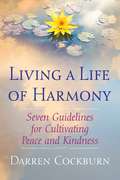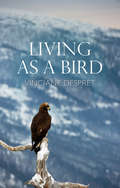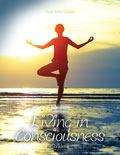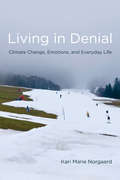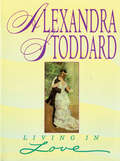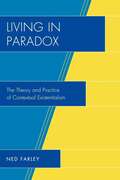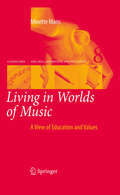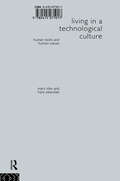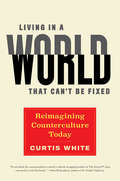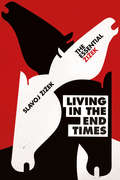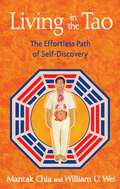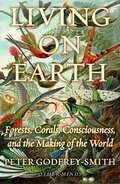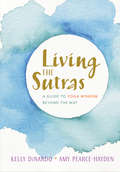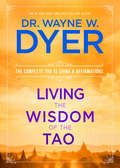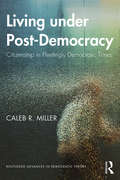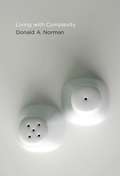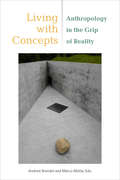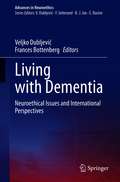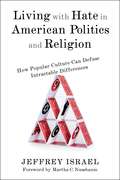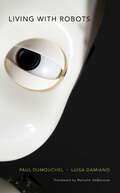- Table View
- List View
Living Zen Remindfully: Retraining Subconscious Awareness
by James H. AustinA seasoned Zen practitioner and neurologist looks more deeply at mindfulness, connecting it to our subconscious and to memory and creativity. This is a book for readers who want to probe more deeply into mindfulness. It goes beyond the casual, once-in-awhile meditation in popular culture, grounding mindfulness in daily practice, Zen teachings, and recent research in neuroscience. In Living Zen Remindfully, James Austin, author of the groundbreaking Zen and the Brain, describes authentic Zen training—the commitment to a process of regular, ongoing daily life practice. This training process enables us to unlearn unfruitful habits, develop more wholesome ones, and lead a more genuinely creative life. Austin shows that mindfulness can mean more than our being conscious of the immediate “now.” It can extend into the subconscious, where most of our brain's activities take place, invisibly. Austin suggests ways that long-term meditative training helps cultivate the hidden, affirmative resource of our unconscious memory. Remindfulness, as Austin terms it, can help us to adapt more effectively and to live more authentic lives. Austin discusses different types of meditation, meditation and problem-solving, and the meaning of enlightenment. He addresses egocentrism (self-centeredness) and allocentrism (other-centeredness), and the blending of focal and global attention. He explains the remarkable processes that encode, store, and retrieve our memories, focusing on the covert, helpful remindful processes incubating at subconscious levels. And he considers the illuminating confluence of Zen, clinical neurology, and neuroscience. Finally, he describes an everyday life of “living Zen,” drawing on the poetry of Basho, the seventeenth-century haiku master.
Living Zen, Loving God
by Ruben L. Habito John P KeenanThe release of Ruben Habito's new book, Living Zen, Loving God has coincided with a rave review from Publishers Weekly magazine: "Habito may not seem himself as a revolutionary, but his humble life calling - to illuminate the commonalities between Zen Buddhism and Christianity - seems a profound gift. Habito excels in illuminating the connective spiritual tissue between the two religions, while explaining the principles of Buddhism. This is an excellent book for readers who want to deepen their understanding of Christianity, as well as Buddhism." - Publishers Weekly Exactly right. This wonderful book, in its friendly, informative tone, carefully explains Buddhist ideas - from key concepts like Emptiness and The Truth of Suffering to an in-depth and enlightening examination of the Heart Sutra - all in terms that will help modern Christian practitioners to deepen their faith, and Buddhists, to revitalize and broaden their perception and understanding. This is a book with immense value to anyone interested in interreligious dialogue and studies, and as such, has already won accolades from Habito's contemporaries. (See below.) Habito, a practicing Catholic and former Jesuit priest - as well as an acknowledged Zen master and professor in the School of Theology at Southern Methodist University - makes a clear case that Zen practice can deepen a Christian's connection to God, further clarify the Gospel teachings of Jesus, and enable one to live a more joyous, compassionate, and socially engaged life. Habito demonstrates that the practice of Zen meditation and even some elements of the Buddhist worldview can enable one to love God more constantly and commit to the service of the Realm of Heaven and the human community more wholeheartedly. Ruben L.F. Habito is the author of numerous publications, in both Japanese and English, on Zen and Christianity and is a prominent figure in the Buddhist-Christian Dialogue. A native of the philipines, Habito served as a Jesuit priest in Japan under the guidance of the great spiritual pioneer Father Hugo Enomiya-Lassalle and studied Zen with renowned teacher Koun Yamada. He lives in Dallas, Texas.
Living Zen: A Practical Guide to a Balanced Existence
by Seth Zuihō Segall PhDFind balance with a hands-on guide to Zen Zen can be achieved by anyone—and Living Zen will show you the way. This simple and straightforward guide helps you bring the practice of Zen into your life with scenarios inspired by the real lives of people who are using Zen strategies to overcome real challenges. Whether you're a new or current practitioner, Living Zen provides you with a quick primer on the ideas behind Zen and its spiritual background before showing you how to bring it into your life. Discover a variety of exercises you can use to achieve peace and balance, complete with anecdotal examples of how Zen works in the real world. Whether it's at home, at work, or on the go, find out how you can apply Zen principles to persevere in difficult times. Living Zen features: Everyday Zen—Learn how Zen can help you with everything from managing anger and jealousy to preparing to study for an exam. Activities for positivity—Get actionable advice for being more present, positive, and balanced in your day-to-day life. Easy to use—Situational guides walk you through the process of staying Zen during the most trying times. Get the guidance you need to make Zen a part of your life.
Living a Life of Harmony: Seven Guidelines for Cultivating Peace and Kindness
by Darren Cockburn7 simple yet powerful guidelines provide a compass for navigating life harmoniously, cultivating a peaceful mind, and spreading kindness • Offers 7 guidelines for living a life of harmony and peace based on existing guidance from Buddhism, Yoga, and other great teachings, integrated and updated for the modern world • Explains how to implement the guidelines in daily life on a practical basis, supported by real-life examples and practices • Illustrates in-depth how and why each of these guidelines hold value and how they provide a set of tools to help us deal with life’s ups and downs more skillfully, mindfully, and compassionately In our very busy world it’s easy to get lost in the details and demands of everyday living. Fatigued and overwhelmed by the sheer amount of information, the myriad of choices our technologically advanced communication era offers, we lose sight of what life is all about. How do we find balance and harmony in this overloaded world? And how do we navigate life in tune with our soul as well as with modern society? As author Darren Cockburn explains, we are all part of one big universal process that encompasses and connects everything--every thought, emotion, action, nature, all there is. Over the centuries, religions and philosophies have provided direction on how to act ethically and in accordance with this process, yet in our modern world, these “rules” may seem outdated or too rigid. Integrating and updating existing guidance from Buddhism, Yoga, and other great teachings, the author offers 7 guidelines for living a life of harmony and balance: honor the body, bring awareness and acceptance into every moment, act with kindness, understand the truth and communicate it skillfully, do only what needs to be done, harmoniously obtain and retain only what you need, and apply the guidelines to your digital device usage. He illustrates how and why each of these guidelines hold value, revealing their interconnections, and explains how to implement them practically in daily life, sharing real-life examples as well as practices to support each guideline and deepen your existing spiritual practice. The author explores how the 7 easy-to-practice guidelines help us gain a deeper understanding of the universal process of life, as well as provide a set of tools to help us deal with life’s ups and downs more skillfully. They enable us to face life empowered and confident, peacefully observe and accept what life presents us with, cultivate compassion and kindness, as well as spread mindfulness to those around us. Practiced together, these guidelines provide a simple yet powerful compass to guide you to a peaceful mind and harmonious living, much needed in today’s world.
Living as a Bird
by Vinciane DespretIn the first days of spring, birds undergo a spectacular metamorphosis. After a long winter of migration and peaceful coexistence, they suddenly begin to sing with all their might, varying each series of notes as if it were an audiophonic novel. They cannot bear the presence of other birds and begin to threaten and attack them if they cross a border, which might be invisible to human eyes but seems perfectly tangible to birds. Is this display of bird aggression just a pretence, a game that all birds play? Or do birds suddenly become territorial – and, if so, why? By attending carefully to the ways that birds construct their worlds and ornithologists have tried to understand them, Despret sheds fresh light on the activities of both and, at the same time, enables us to become more aware of the multiple worlds and modes of existence that characterize the planet we share in common with birds and other species.
Living in Consciousness Workbook
by Paula Heller-GarlandIn order to change it is important to know who you are, what you believe, and how you became that person. Only then can we live more comfortably in the present and cease unconscious reactions that result in undesired outcomes. <p><p> Living in Consciousness provides communication tips, techniques and examples, but on a deeper level, it will assist you in discovering the obstacles to your connection with others. It will provide a groundwork to understanding yourself in order to better understand others. <p> The workbook and program takes a look at who you are - from the inside out, how you became that person and assists you to map necessary changes. It is thought provoking, insightful and transformational. There is no limit to the benefits from taking on the challenges of this self-discovery.
Living in Denial: Climate Change, Emotions, and Everyday Life
by Kari Marie NorgaardAn analysis of why people with knowledge about climate change often fail to translate that knowledge into action.Global warming is the most significant environmental issue of our time, yet public response in Western nations has been meager. Why have so few taken any action? In Living in Denial, sociologist Kari Norgaard searches for answers to this question, drawing on interviews and ethnographic data from her study of "Bygdaby," the fictional name of an actual rural community in western Norway, during the unusually warm winter of 2000-2001.In 2000-2001 the first snowfall came to Bygdaby two months later than usual; ice fishing was impossible; and the ski industry had to invest substantially in artificial snow-making. Stories in local and national newspapers linked the warm winter explicitly to global warming. Yet residents did not write letters to the editor, pressure politicians, or cut down on use of fossil fuels. Norgaard attributes this lack of response to the phenomenon of socially organized denial, by which information about climate science is known in the abstract but disconnected from political, social, and private life, and sees this as emblematic of how citizens of industrialized countries are responding to global warming.Norgaard finds that for the highly educated and politically savvy residents of Bygdaby, global warming was both common knowledge and unimaginable. Norgaard traces this denial through multiple levels, from emotions to cultural norms to political economy. Her report from Bygdaby, supplemented by comparisons throughout the book to the United States, tells a larger story behind our paralysis in the face of today's alarming predictions from climate scientists.
Living in Love
by Alexandra StoddardWith the warmth and affection that has made her America's favorite lifestyle philosopher, bestselling author Alexander Stoddard shows readers how to find love within themselves, bring love into their lives, and enjoy living a lifetime in love.
Living in Paradox: The Theory and Practice of Contextual Existentialism
by Ned FarleyThis book focuses on the emergence of contextual existential theory and practice from more traditional existential psychology. Farley addresses the diversity of humankind and the need to be culturally aware as we attempt to address the dilemmas that present themselves to us in our daily lives.
Living in Worlds of Music
by Minette MansInformed by her in-depth ethnomusical knowledge, the result of detailed fieldwork, Mans's book is about musical worlds and how we as people inhabit them. The book asserts that an understanding of our musical worlds can be a transformative educational tool that could have a significant role to play in multicultural music and arts education. She explores the way in which musical expression, with its myriad cultural variations, reveals much about identity and cultural norms, and shows how particular musical sounds are aesthetically related to these norms. The author goes further to suggest that similar systems can be detected across cultures, while each world remains colored by a distinctive soundscape. Mans also looks at the way each cultural soundscape is a symbolic manifestation of a society's collective cognition, sorting musical behavior and sounds into clusters and patterns that fulfill each society's requirements. She probes the fact that in today's globalized and mobile world, as people move from one society to another, cross-cultural acts and hybrids result in a number of new aesthetics. Finally, in addition to three personal narratives by musicians from different continents, the author has invited scholars from diverse specializations and locations to comment on different sections of the book, opening up a critical dialogue with voices from different parts of the globe. Musical categorization, identity, values, aesthetic evaluation, creativity, curriculum, assessment and teacher education are some of the issues tackled in this manner.
Living in a Technological Culture: Human Tools and Human Values (Philosophical Issues in Science)
by Mary Tiles Hans OberdiekTechnology is no longer confined to the laboratory but has become an established part of our daily lives. Its sophistication offers us power beyond our human capacity which can either dazzle or threaten; it depends who is in control. Living in a Technological Culture challenges traditionally held assumptions about the relationship between `man-and-machine'. It argues that contemporary science does not shape technology but is shaped by it. Neither discipline exists in a moral vacuum, both are determined by politics rather than scientific inquiry. By questioning our existing uses of technology, this book opens up wider debate on the shape of things to come and whether we should be trying to change them now. As an introduction to the philosophy of technology this will be valuable to students, but will be equally engaging for the general reader.
Living in a World that Can't Be Fixed: Reimagining Counterculture Today
by Curtis White&“This is a book about counterculture, and that&’s a problem . . . &“ So begins Curtis White&’s thrilling call for the revitalization of counterculture today. The problem, White argues, is twofold: first, most of us think of counterculture as a phenomenon stuck in the 1960s, and, second, what passes as counterculture today . . . simply isn&’t. Nevertheless, a reimagined counterculture is our best hope to save the planet, bypass social antagonisms, and create the world we actually want to live in. Now. White—&“the most inspiringly wicked social critic of the moment" (Will Blythe, Elle)—shows how the products of our so-called resistance, from Ken Burns to Black Panther, rarely offer a meaningful challenge to power, and how our loyalty to the &“American Lifestyle&” is self-defeating and keeps us from making any real social change. The result is an inspiring case for practicing civil disobedience as a way of life, and a clear vision for a better world—full of play, caring, and human connection.
Living in the End Times
by Slavoj ZizekThe underlying premise of the book is a simple one: the global capitalist system is approaching an apocalyptic zero-point. Its four riders of the apocalypse are the ecological crisis, the consequences of the biogenetic revolution, the imbalances within the system itself (problems with intellectual property, the forthcoming struggle for raw materials, food and water), and the explosions of social divisions and exclusions. Society's first reaction is ideological denial, then explosions of anger at the injustices of the new world order, attempts at bargaining, and when this fails, depression and withdrawal set in. Finally, after passing through this zero-point we no longer perceive it as a threat, but as the chance for a new beginning. or, as Mao Zedong might have put it, "There is great disorder under heaven, the situation is excellent." i ek traces out in detail these five stances, makes a plea for a return to the Marxian critique of political economy, and sniffs out the first signs of a budding communist culture in all its diverse forms--in utopias that range from Kafka's community of mice to the collective of freak outcasts in the TV series Heroes.
Living in the Tao: The Effortless Path of Self-Discovery
by Mantak Chia William U. WeiTaoist techniques that can quiet your mind so you can discover your true self in the wisdom of the heart • Teaches that the Tao is the flow of nature, the effortless middle path of self-discovery • Shows how to quiet the monkey mind (the ego) and listen within for your inner voice • Fosters a connection to the Tao through diet, exercise, livelihood, and sexuality Taoists say that we must learn to observe with the mind and think with the heart. In the West we get caught up in the “monkey mind” of our ego. We think we can control our individual destinies by swimming upstream against the current, but we are mistaken. When we learn to quiet the monkey mind with meditation practices, we are able to go beyond the linear thinking of the upper brain and connect to the multidimensional thinking of supreme consciousness in the heart center. In Living in the Tao, Master Mantak Chia and William Wei present techniques to help us learn to move beyond the limits of time and space to connect with the universal truth within--without striving. Living in the Tao is effortless. Just as a small seed grows into a mighty tree with a little water and a little sunshine every day, a few minutes of Taoist practice each day can transform your life into one of peace and joy.
Living on Earth: Forests, Corals, Consciousness, and the Making of the World
by Peter Godfrey-SmithThe bestselling author of Other Minds shows how we and our ancestors have reinvented our planet.If the history of the Earth were compressed down to a year, our species would arise in the last thirty minutes or so of the final hour. But life itself is not such a late arrival: It has existed on Earth for something like 3.7 billion years—most of our planet’s history and over a quarter of the age of the universe (as far as we can tell). What have these organisms—bacteria, animals, plants, and the rest—done in all this time? In Living on Earth, the philosopher Peter Godfrey-Smith proposes a new way of understanding how the actions of living beings have shaped our planet. Where his acclaimed books Other Minds and Metazoa explored the riddle of how conscious minds came to exist on Earth, Living on Earth turns to what happens when we look at the mind from another side—when we come to see organisms as active causes, not merely as results of the evolutionary process. The planet we inhabit is significantly the work of other living beings, who shaped the environments that we ourselves later transformed. To that end, Godfrey-Smith takes us on a grand tour of the history of life on earth. He visits Rwandan gorillas and Australian bowerbirds, returns to coral reefs and octopus dens, considers the impact of language and writing, and weighs the responsibilities our unique powers bring with them, as they relate to factory farming, habitat preservation, climate change, and the use of animals in experiments. Ranging from the seas to the forests, and from animate matter’s first appearance to its future extinction, Godfrey-Smith offers a novel picture of the course of life on Earth and how we might meet the challenges of our time, the Anthropocene.
Living the Qur'an in Our Times
by Jamal KhwajaIn a world where powerful lobbies are vilifying the Qur'an as the underlying cause of conflicts-conflicts that are actually rooted in greed and the self-serving secular politics of oil, occupation and social injustice-how can non-Muslims discover the authentic teachings of the Qur'an? How can they work with Muslims to overcome mutual suspicions, stereotyping, and self-serving propaganda? A starting point is would be to recognize that Muslims worldwide are engaged in diverse and robust internal debates. While it is an integral part of the Islamic faith that the Qur'an is the infallible "Word of God," the plain fact is that there is significant disagreement among the faithful over what the revealed texts mean or imply on a host of issues. In Living the Qur'an in Our Times, the author combines theological insight and philosophical erudition to delve into the semantics of the Qur'an and its vision. This work explains why traditional religion has failed to respond adequately to challenges posed by modernity. It strives to recognize the intimate connection between a Muslim's struggle to live the Qur'an authentically and the many ethical and moral dilemmas one faces daily in one's life. Enlightening for all those who are unfamiliar with Islamic history and the Qur'an, this book explores foundational Islamic principles that emphasize mutual respect and cooperation among all people, thus helping cultivate a vibrant Islamic identity in today's interdependent, multicultural global environment.
Living the Sutras: A Guide to Yoga Wisdom beyond the Mat
by Kelly DiNardo Amy Pearce-HaydenBring the wisdom of ancient Yoga philosophy into your life in a fresh, accessible, and relevant way.In its highest form, yoga is a practice for your body and your mind. Living the Sutras brings the wisdom of classical yoga philosophy into your life in an accessible and relevant way. The Yoga Sutras, a foundational text of yoga philosophy and practice, written by the guru Patanjali over two thousand years ago, are made up of 196 aphorisms that offer potent teachings on how to deal with loss and pain, and guidance on how to lead a healthy and fulfilling life. Kelly DiNardo and Amy Pearce-Hayden offer an entrée to this yoga training for the mind and spirit by introducing a sutra or group of sutras on a related theme, providing a brief commentary, and writing prompts to allow you to reflect on and apply the meaning of the sutras to your life. The book is at once an introduction to the classical philosophy, a quick guide for students and teachers, and an active self-study that helps you to engage with yoga wisdom in a deeply personal way.
Living the Wisdom of the Tao: The Complete Tao Te Ching And Affirmations
by Wayne W. DyerThis book offers you an opportunity to internalize and directly experience the great wisdom of the Tao Te Ching, a collection of verses authored by the Chinese prophet Lao-tzu. The words Tao Te Ching translate to ‘living and applying the Great Way.’
Living under Post-Democracy: Citizenship in Fleetingly Democratic Times (Routledge Advances in Democratic Theory)
by Caleb R. MillerWhen money equates to power and the system is rigged in favor of wealthy elites, why do we still pretend we are living in a democracy? In Living under Post-Democracy, Caleb R. Miller challenges us to admit what we already know: that most of us are effectively powerless over the political decisions that govern our lives. Instead, we should embrace a 'post-democratic' view of politics, one which recognizes the way in which our political institutions fail—both systematically and historically—to live up to our democratic ideals, while also acknowledging our tragic, yet enduring attachment to them both. Offering a new framework for conceptualizing contemporary citizenship, Miller explores how a post-democratic perspective can help us begin to reorient ourselves in our paradoxical, fractured political landscape. This model of citizenship opens the possibility for a distinctly post-democratic approach to both political participation and political philosophy, treating them not as ways of affecting politics, but as opportunities for therapeutically engaging with the ongoing challenges and inevitable frustrations of post-democratic life. This book is an excellent addition to courses on democratic theory, as well as introductory courses to political theory.
Living with Animals
by Michael PomedliWithin nineteenth-century Ojibwe/Chippewa medicine societies, and in communities at large, animals are realities and symbols that demonstrate cultural principles of North American Ojibwe nations. Living with Animals presents over 100 images from oral and written sources - including birch bark scrolls, rock art, stories, games, and dreams - in which animals appear as kindred beings, spirit powers, healers, and protectors.Michael Pomedli shows that the principles at play in these sources are not merely evidence of cultural values, but also unique standards brought to treaty signings by Ojibwe leaders. In addition, these principles are norms against which North American treaty interpretations should be reframed. The author provides an important foundation for ongoing treaty negotiations, and for what contemporary Ojibwe cultural figures corroborate as ways of leading a good, integrated life.
Living with Complexity
by Donald A. NormanIf only today's technology were simpler! It's the universal lament, but it's wrong. In this provocative and informative book, Don Norman writes that the complexity of our technology must mirror the complexity and richness of our lives. It's not complexity that's the problem, it's bad design. Bad design complicates things unnecessarily and confuses us. Good design can tame complexity. Norman gives us a crash course in the virtues of complexity. Designers have to produce things that tame complexity. But we too have to do our part: we have to take the time to learn the structure and practice the skills. This is how we mastered reading and writing, driving a car, and playing sports, and this is how we can master our complex tools. Complexity is good. Simplicity is misleading. The good life is complex, rich, and rewarding -- but only if it is understandable, sensible, and meaningful.
Living with Concepts: Anthropology in the Grip of Reality (Thinking from Elsewhere)
by Veena Das Michael Lambek Sandra Laugier Michael Puett Jocelyn Benoist Rasmus Dyring Thomas Schwarz Wentzer Michael D. Jackson Andrew Brandel Michael Cordey Marco Motta Lotte Buch SegalAn interdisciplinary collaboration that explores what it means to live with concepts, rather than think of them as mere tools for analysis.
Living with Dementia: Neuroethical Issues and International Perspectives (Advances in Neuroethics)
by Veljko Dubljević Frances BottenbergThis book addresses current issues in the neuroscience and ethics of dementia care, including philosophical as well as ethical legal, and social issues (ELSIs), issues in clinical, institutional, and private care-giving, and international perspectives on dementia and care innovations. As such, it is a must-read for anyone interested in a well-researched, thought-provoking overview of current issues in dementia diagnosis, care, and social and legal policy. All contributions reflect the latest neuroscientific research on dementia, either broadly construed or in terms of the etiologies and symptoms of particular forms of dementia. Given its interdisciplinary and international scope, its depth of research, and its qualitative emphasis, the book represents a valuable addition to the available literature on neuroethics, gerontology, and neuroscientific memory research.
Living with Hate in American Politics and Religion: How Popular Culture Can Defuse Intractable Differences
by Jeffrey IsraelIn the United States, people are deeply divided along lines of race, class, political party, gender, sexuality, and religion. Many believe that historical grievances must eventually be left behind in the interest of progress toward a more just and unified society. But too much in American history is unforgivable and cannot be forgotten. How then can we imagine a way to live together that does not expect people to let go of their entrenched resentments?Living with Hate in American Politics and Religion offers an innovative argument for the power of playfulness in popular culture to make our capacity for coexistence imaginable. Jeffrey Israel explores how people from different backgrounds can pursue justice together, even as they play with their divisive grudges, prejudices, and desires in their cultural lives. Israel calls on us to distinguish between what belongs in a raucous “domain of play” and what belongs in the domain of the political. He builds on the thought of John Rawls and Martha Nussbaum to defend the liberal tradition against challenges posed by Frantz Fanon from the left and Leo Strauss from the right. In provocative readings of Lenny Bruce’s stand-up comedy, Philip Roth’s Portnoy’s Complaint, and Norman Lear’s All in the Family, Israel argues that postwar Jewish American popular culture offers potent and fruitful examples of playing with fraught emotions. Living with Hate in American Politics and Religion is a powerful vision of what it means to live with others without forgiving or forgetting.
Living with Robots
by Paul Dumouchel Luisa DamianoFrom artificial intelligence to artificial empathy, “a timely and well-written volume that addresses many contemporary and future moral questions” (Library Journal).Today’s robots engage with human beings in socially meaningful ways, as therapists, trainers, mediators, caregivers, and companions. Social robotics is grounded in artificial intelligence, but the field’s most probing questions explore the nature of the very real human emotions that social robots are designed to emulate.Social roboticists conduct their inquiries out of necessity—every robot they design incorporates and tests a number of hypotheses about human relationships. Paul Dumouchel and Luisa Damiano show that as roboticists become adept at programming artificial empathy into their creations, they are abandoning the conventional conception of human emotions as discrete, private, internal experiences. Rather, they are reconceiving emotions as a continuum between two actors who coordinate their affective behavior in real time. Rethinking the role of sociability in emotion has also led the field of social robotics to interrogate a number of human ethical assumptions, and to formulate a crucial political insight: there are simply no universal human characteristics for social robots to emulate. What we have instead is a plurality of actors, human and nonhuman, in noninterchangeable relationships.Foreshadowing an inflection point in human evolution, Living with Robots shows that for social robots to be effective, they must be attentive to human uniqueness and exercise a degree of social autonomy. More than mere automatons, they must become social actors, capable of modifying the rules that govern their interplay with humans.“A detailed tour of the philosophy of artificial intelligence (AI)?especially as it applies to robots intended to build social relationships with humanity. . . . If we are to build a robust, appropriate ethical structure around the next generation of technical development?some combination of deep learning, artificial intelligence, robotics and artificial empathy?we need to understand that managing the impact of these technologies is far too important to be left to those who are enthusiastically engaged in producing them.” —Times Higher Education
